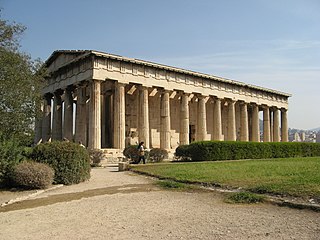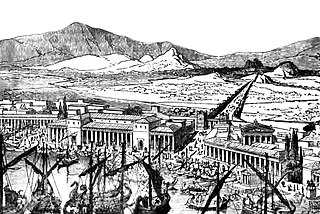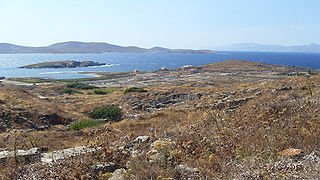An acropolis was the settlement of an upper part of an ancient Greek city, especially a citadel, and frequently a hill with precipitous sides, mainly chosen for purposes of defense. The term is typically used to refer to the Acropolis of Athens, yet every Greek city had an acropolis of its own. Acropolises were used as religious centers and places of worship, forts, and places in which the royal and high-status resided in. Acropolises became the nuclei of large cities of classical ancient times, and served as important centers of a community. Some well-known acropolises have become the centers of tourism in present-day, and, especially, the Acropolis of Athens has been a revolutionary center for the studies of ancient Greece since the Mycenaean period. Many of them have become a source of revenue for Greece, and represent some great technology during the period.

The Delian League, founded in 478 BC, was an association of Greek city-states, with the number of members numbering between 150 and 330 under the leadership of Athens, whose purpose was to continue fighting the Persian Empire after the Greek victory in the Battle of Plataea at the end of the Second Persian invasion of Greece.

The Acropolis of Athens is an ancient citadel located on a rocky outcrop above the city of Athens and contains the remains of several ancient buildings of great architectural and historical significance, the most famous being the Parthenon. The word acropolis is from the Greek words ἄκρον and πόλις. The term acropolis is generic and there are many other acropoleis in Greece. During ancient times the Acropolis of Athens was known also more properly as Cecropia, after the legendary serpent-man, Cecrops, the supposed first Athenian king.

The Parthenon is a former temple on the Athenian Acropolis, Greece, that was dedicated to the goddess Athena during the fifth century BC. Its decorative sculptures are considered some of the high points of Greek art, an enduring symbol of Ancient Greece, democracy and Western civilization.
Apollodorus was a popular name in ancient Greece. It is the masculine gender of a noun compounded from Apollo, the deity, and doron, "gift"; that is, "Gift of Apollo." It may refer to:
Fifth-century Athens is the Greek city-state of Athens in the time from 480 to 404 BC. Formerly known as the Golden Age of Athens, the later part being the Age of Pericles, it was buoyed by political hegemony, economic growth and cultural flourishing. The period began in 478 BC, after the defeat of the Persian invasion, when an Athenian-led coalition of city-states, known as the Delian League, confronted the Persians to keep the liberated Asian Greek cities free.

Cleisthenes, or Clisthenes, was an ancient Athenian lawgiver credited with reforming the constitution of ancient Athens and setting it on a democratic footing in 508 BC. For these accomplishments, historians refer to him as "the father of Athenian democracy." He was a member of the aristocratic Alcmaeonid clan. He was the younger son of Megacles and Agariste, making him the maternal grandson of the tyrant Cleisthenes of Sicyon. He was also credited with increasing the power of the Athenian citizens' assembly and for reducing the power of the nobility over Athenian politics.
Timon is a masculine given name and a surname which may refer to:

The Temple of Hephaestus or Hephaisteion, is a well-preserved Greek temple dedicated to Hephaestus; it remains standing largely intact today. It is a Doric peripteral temple, and is located at the north-west side of the Agora of Athens, on top of the Agoraios Kolonos hill. From the 7th century until 1834, it served as the Greek Orthodox church of Saint George Akamates. The building's condition has been maintained due to its history of varied use.

The ancient Agora of Athens is the best-known example of an ancient Greek agora, located to the northwest of the Acropolis and bounded on the south by the hill of the Areopagus and on the west by the hill known as the Agoraios Kolonos, also called Market Hill. The Agora's initial use was for a commercial, assembly, or residential gathering place.
Constitution of the Athenians may refer to either of two ancient treatises on the subject of the government of Athens:
The ancient Greek word oikos refers to three related but distinct concepts: the family, the family's property, and the house. Its meaning shifts even within texts, which can lead to confusion.

Although long walls were built at several locations in ancient Greece, notably Corinth and Megara, the term Long Walls generally refers to the walls that connected Athens main city to its ports at Piraeus and Phaleron.
Athenian school or variation, may refer to:
The First Peloponnesian War was fought between Sparta as the leaders of the Peloponnesian League and Sparta's other allies, most notably Thebes, and the Delian League led by Athens with support from Argos. This war consisted of a series of conflicts and minor wars, such as the Second Sacred War. There were several causes for the war including the building of the Athenian long walls, Megara's defection and the envy and concern felt by Sparta at the growth of the Athenian Empire.

Classical Greece was a period of around 200 years in Ancient Greece, marked by much of the eastern Aegean and northern regions of Greek culture gaining increased autonomy from the Persian Empire; the peak flourishing of democratic Athens; the First and Second Peloponnesian Wars; the Spartan and then Theban hegemonies; and the expansion of Macedonia under Philip II. Much of the early defining politics, artistic thought, scientific thought, theatre, literature and philosophy of Western civilization derives from this period of Greek history, which had a powerful influence on the later Roman Empire. The Classical era ended after Philip II's unification of most of the Greek world against the common enemy of the Persian Empire, which was conquered within 13 years during the wars of Alexander the Great, Philip's son.

The city of Athens during the classical period of ancient Greece was the major urban centre of the notable polis (city-state) of the same name, located in Attica, Greece, leading the Delian League in the Peloponnesian War against Sparta and the Peloponnesian League. Athenian democracy was established in 508 BC under Cleisthenes following the tyranny of Isagoras. This system remained remarkably stable, and with a few brief interruptions remained in place for 180 years, until 322 BC. The peak of Athenian hegemony was achieved in the 440s to 430s BC, known as the Age of Pericles.

The Wars of the Delian League were a series of campaigns fought between the Delian League of Athens and her allies, and the Achaemenid Empire of Persia. These conflicts represent a continuation of the Greco-Persian Wars, after the Ionian Revolt and the first and second Persian invasions of Greece.

The following outline is provided as an overview of and topical guide to ancient Greece:
Pandion was the eponymous hero of the Attic tribe Pandionis, which was created as part of the tribal reforms of Cleisthenes at the end of the sixth century BC. He is usually assumed to be one of the two legendary kings of Athens, Pandion I or Pandion II.









